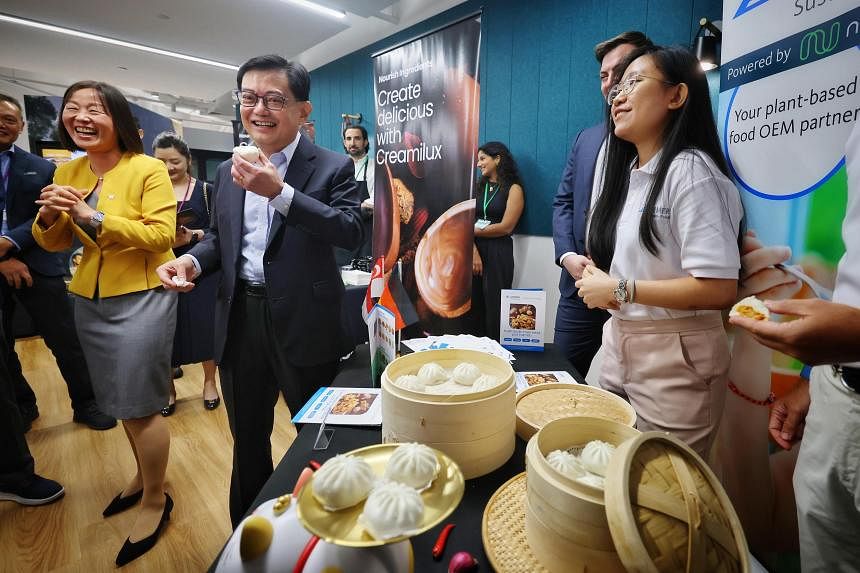SINGAPORE – A new centre where firms can get help enhancing the taste and nutritional benefits of their sustainable food products to help nudge consumer acceptance was launched on April 24.
Temasek-backed sustainable food production platform Nurasa’s Food Tech Innovation Centre aims to help companies scale up production of their alternative protein products and bring them closer to commercialisation.
“The centre provides a space for different companies to come together and innovate, which benefits not just Singapore but also the wider region,” said Deputy Prime Minister Heng Swee Keat at the centre’s official launch at Biopolis.
However, more can be done to reduce the costs of innovation and lower the barriers to entry for new ideas, and create a “differentiating edge”, he added.
“Public-private partnerships, for instance, can help to accelerate innovation by kick-starting research and development in areas of emerging technology, facilitating talent exchange and minimising duplications in investments.”
The Food Tech Innovation Centre, which has been operational since early 2023, has two joint labs, which are public-private partnerships between Nurasa, contract manufacturer ScaleUp Bio, as well as A*Star and other research institutes.
These labs include a precision fermentation lab, where micro-organisms like yeast, fungi and bacteria are genetically engineered to produce key food ingredients like proteins and flavour compounds; as well as a high moisture extrusion lab, which essentially helps to shape plant-based proteins into meat-like products.
Both labs serve as small-scale manufacturing facilities for companies to produce a limited sample of products that can be used for market testing at an early stage, Nurasa’s chief executive Guo Xiuling said in an interview with reporters on April 24.
That way, companies will be able to tweak their products according to consumer feedback at an early stage, and eventually commercialise a finalised product that is accepted by the public, added Ms Guo.
Collaborations between companies at Nurasa have also made it possible to improve the taste of these alternative protein products.
Australian food-tech company Nourish Ingredients, for instance, uses precision fermentation to replicate natural fats, or lipids, missing in alternative protein products, like plant-based chicken, to help enhance their meaty taste and aroma.
For the launch event, Nourish Ingredients worked with Cremer Sustainable Foods, a joint venture between Nurasa and German agrifood multinational Cremer, to create a plant-based chicken satay that was “enhanced” with its natural fat ingredient, which gave the dish a more meaty and juicy character.
The ingredient, known as Tastilux, was created using a type of soil-based fungus species that was processed using precision fermentation.
The company is still in the midst of applying for regulatory approval with the Singapore Food Agency for Tastilux to be sold to consumers.
Beyond tackling the “protein” component of a diet, fats also form part of the puzzle, as do fibers and other micronutrients that are essential to a person’s overall health. These, too, need to be taken into consideration when it comes to sustainable food production, said Ms Guo.
With Nourish Ingredients, precision fermentation was able to convert a plant-based source to plant-based protein, noted Ms Guo.
But this technology can do more than just that – it can also be used for creating certain enzymes and prebiotics, which can offer consumers natural solutions that have a “low impact” on the environment.
After starting with plant-based innovations, the company now has more capabilities to “include much broader nutrition-focused innovations, and invite more start-ups (in the space) to create holistic solutions for consumers”, she added.
Cool innovations from Nurasa’s partners
1. Chocolate milk with less cocoa
Swiss manufacturer Givaudan said that it has been able to create chocolate milk with 50 per cent less cocoa while retaining its taste and mouthfeel. The taste is instead replicated using a concoction of different types of ingredients.
Cocoa farmers usually clear tropical forests to plant new cocoa trees, which has been one of the drivers of deforestation globally.
The company said that this can help them reduce its carbon footprint and its supply dependency on cocoa.
Givaudan also showcased a lemon-lime carbonated soft drink that is infused with acerola, a rich natural source of vitamin C.
2. Plant-based chicken satay infused with animal fats
Nourish Ingredients uses precision fermentation to create a natural fat ingredient known as Tastilux that can be added to plant-based meat, like chicken satay, to help enhance its meaty flavour.
The company also created Creamilux, which has a creamy texture and serves as an alternative to dairy fat. This can be used to enhance the flavour of vegan chocolate, for example.
3. Plant-based chilli crab pau
Cremer Sustainable Foods partnered with local food manufacturer Lim Kee to create plant-based chilli crab pau, which was officially launched on April 24. The company said that it worked with Givaudan to enhance the authenticity of its chilli crab flavour.
Cremer Sustainable Foods produces some 1,300 tonnes of plant-based products yearly at its manufacturing plant in Tuas. Some of its products include plant-based duck strips and siew mai.
The company will be looking to launch ready-made plant-based black pepper chicken and laksa in June.
4. Oat latte made from bean-free coffee
Home-grown sustainable bio-flavours start-up Prefer creates its “coffee” from day-old bread, soya bean pulp and spent barley grains sourced from local food manufacturers.
These ingredients are blended, fermented with food-grade microbes and roasted in an oven to enhance the aroma and flavours.
While Prefer’s grounds are caffeine-free, caffeine powder derived from tea can be added to the mix if desired.


